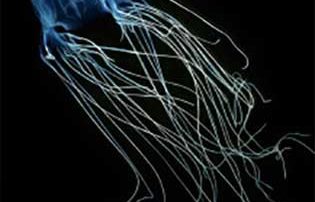Jellyfish Central is my ongoing collection of articles, research and thoughts on jellyfish and invertebrate.
Jellyfish captured my attention and imagination in the mid-1980s, about midway through my fifty-year career in vision research. At the time I was chief of the Laboratory of Molecular and Developmental Biology, National Eye Institute, National Institutes of Health (NIH) in Bethesda, Maryland. My specialty was gene expression in the eyes of vertebrates.
While reading a new book on invertebrate vision, I learned that complex jellyfish eye looked like a variation of the highly evolved human eye!
It appeared to me that Jellyfish eyes seemed much more than evolutionary stepping-stones to vertebrate eyes; they were small jewels.
I suddenly, impulsively, wanted to study jellyfish eyes. Stepping into the strange universe of jellyfish resonated with the excitement I had in choosing a career in biology many years earlier. But where to start?…

